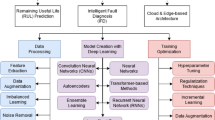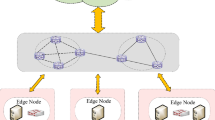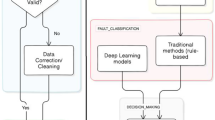Abstract
Edge computing is a paradigm in which data is intelligently processed close to its source. Along with advancements in deep learning, there is a growing interest in using deep neural networks at the edge for predictive analytics. Given the realistic constraints in computational resources of edge devices, this combination is challenging. In order to bridge the gap between deep learning models and efficient edge analytics, a container-based framework is presented that evaluates user-specified deep learning models for efficiency on the edge. The proposed framework is validated on a rotating machinery fault diagnosis use case. Conclusions on efficient state-of-the-art models for rotating machine fault diagnosis were drawn and appropriately reported.
Access this chapter
Tax calculation will be finalised at checkout
Purchases are for personal use only
Similar content being viewed by others
Notes
- 1.
The source code of the framework as well as the associated scripts to reproduce the performed experiments on the fault diagnosis use case are available via https://gitlab.com/Chandu1007/edge-benchmarking-framework.
- 2.
References
ADVANTECH: Advantech UNO-2272g (2022). https://www.advantech.com/products/1-2mlj9a/uno-2272g/mod_2f889619-f9ba-4735-a432-7ac7a08669c4
Khan, S., Yairi, T.: A review on the application of deep learning in system health management. Mech. Syst. Signal Process. 107, 241–265 (2018) https://doi.org/10.1016/j.ymssp.2017.11.024, https://www.sciencedirect.com/science/article/pii/S0888327017306064
Lei, Y., Yang, B., Jiang, X., Jia, F., Li, N., Nandi, A.K.: Applications of machine learning to machine fault diagnosis: a review and roadmap. Mech. Syst. Signal Process. 138, 106587 (2020). https://doi.org/10.1016/j.ymssp.2019.106587, https://www.sciencedirect.com/science/article/pii/S0888327019308088
McKinsey: Growing opportunities in the Internet of Things (2019). https://www.mckinsey.com/industries/private-equity-and-principal-investors/our-insights/growing-opportunities-in-the-internet-of-things
Mosa, A., Sakellariou, R.: Dynamic virtual machine placement considering CPU and memory resource requirements. In: 2019 IEEE 12th International Conference on Cloud Computing (CLOUD), pp. 196–198 (2019). https://doi.org/10.1109/CLOUD.2019.00042
Shao, S.: SEU gearbox dataset. https://github.com/cathysiyu/Mechanical-datasets. Accessed Aug. 2022
Shi, W., Pallis, G., Xu, Z.: Edge computing. Proc. IEEE 107(8), 1474–1481 (2019). https://doi.org/10.1109/JPROC.2019.2928287
Tang, S., Yuan, S., Zhu, Y.: Deep learning-based intelligent fault diagnosis methods toward rotating machinery. IEEE Access 8, 9335–9346 (2020). https://doi.org/10.1109/ACCESS.2019.2963092
Yadav, A.K., Garg, M.L., Ritika: Docker containers versus virtual machine-based virtualization. In: Abraham, A., Dutta, P., Mandal, J.K., Bhattacharya, A., Dutta, S. (eds.) Emerging Technologies in Data Mining and Information Security, pp. 141–150. Springer, Singapore (2019). https://doi.org/10.1007/978-981-13-1501-5_12
Zhang, S., Zhang, S., Wang, B., Habetler, T.G.: Deep learning algorithms for bearing fault diagnostics - a comprehensive review. IEEE Access 8, 29857–29881 (2020). https://doi.org/10.1109/ACCESS.2020.2972859
Zhao, D.M., Zhou, J.T., Li, K.: An energy-aware algorithm for virtual machine placement in cloud computing. IEEE Access 7, 55659–55668 (2019). https://doi.org/10.1109/ACCESS.2019.2913175
Zhao, Z., et al.: Deep learning algorithms for rotating machinery intelligent diagnosis: an open source benchmark study. ISA Trans. 107, 224–255 (2020). https://doi.org/10.1016/j.isatra.2020.08.010, https://www.sciencedirect.com/science/article/pii/S0019057820303335
Zhou, Z., Chen, X., Li, E., Zeng, L., Luo, K., Zhang, J.: Edge intelligence: paving the last mile of artificial intelligence with edge computing. Proc. IEEE 107(8), 1738–1762 (2019). https://doi.org/10.1109/JPROC.2019.2918951
Author information
Authors and Affiliations
Corresponding author
Editor information
Editors and Affiliations
Rights and permissions
Copyright information
© 2023 The Author(s), under exclusive license to Springer Nature Switzerland AG
About this paper
Cite this paper
Sorescu, TG., Kancharla, C.R., Boydens, J., Hallez, H., Verbeke, M. (2023). Framework to Evaluate Deep Learning Algorithms for Edge Inference and Training. In: Koprinska, I., et al. Machine Learning and Principles and Practice of Knowledge Discovery in Databases. ECML PKDD 2022. Communications in Computer and Information Science, vol 1752. Springer, Cham. https://doi.org/10.1007/978-3-031-23618-1_38
Download citation
DOI: https://doi.org/10.1007/978-3-031-23618-1_38
Published:
Publisher Name: Springer, Cham
Print ISBN: 978-3-031-23617-4
Online ISBN: 978-3-031-23618-1
eBook Packages: Computer ScienceComputer Science (R0)




